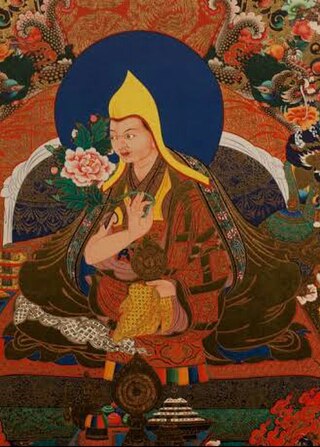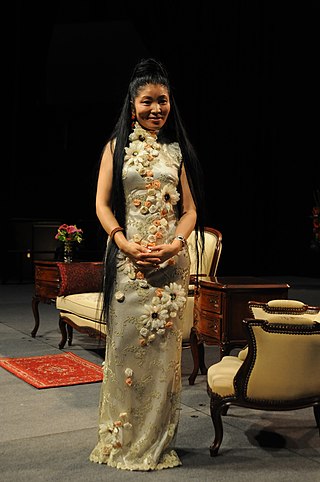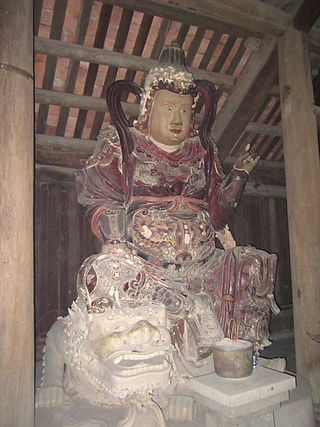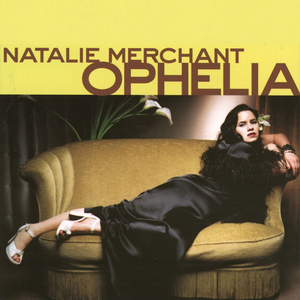
Gedun Drupa was considered posthumously to have been the 1st Dalai Lama.

Yungchen Lhamo is a Tibetan singer-songwriter living in the United States. She won the ARIA Award for Best World Music Album in 1995 and was then signed by Peter Gabriel's Real World record label.

In Buddhism, wrathful deities or fierce deities are the fierce, wrathful or forceful forms of enlightened Buddhas, Bodhisattvas or Devas ; normally the same figure has other, peaceful, aspects as well. Because of their power to destroy the obstacles to enlightenment, they are also termed krodha-vighnantaka, "Wrathful onlookers on destroying obstacles". Wrathful deities are a notable feature of the iconography of Mahayana and Vajrayana Buddhism, especially in Tibetan art. These types of deities first appeared in India during the late 6th century, with its main source being the Yaksha imagery, and became a central feature of Indian Tantric Buddhism by the late 10th or early 11th century.

A dharmapāla is a type of wrathful god in Buddhism. The name means "dharma protector" in Sanskrit, and the dharmapālas are also known as the Defenders of the Justice (Dharma), or the Guardians of the Law. There are two kinds of dharmapala, Worldly Guardians (lokapala) and Wisdom Protectors (jnanapala). Only Wisdom Protectors are enlightened beings.

Ophelia is the second studio album by the American singer-songwriter Natalie Merchant, released on May 19, 1998, by Elektra Records. The album was supported by the singles "Kind & Generous" and "Break Your Heart", with the former being the most successful single of the album, reaching the top 20 of the Billboard Hot 100 Airplay Chart. "Break Your Heart" also received single and video treatment. These and the other videos from the album, plus three from Tigerlily, were gathered on a Warner Music Vision home video, also entitled Ophelia. "I love the opportunity to flex my thespian muscle," Merchant quips on it. The album became Merchant's only top ten hit on the Billboard 200, where it peaked at number eight.
Real World Records is a British record label specializing in world music. It was founded in 1989 by English musician Peter Gabriel and original members of WOMAD. A majority of the works released on Real World Records feature music recorded at Real World Studios, in Box, Wiltshire, England.

The music of Tibet reflects the cultural heritage of the trans-Himalayan region centered in Tibet, but also known wherever ethnic Tibetan groups are found in Nepal, Bhutan, India and further abroad. The religious music of Tibet reflects the profound influence of Tibetan Buddhism on the culture.

Jonathan Elias is an American composer best known for his film soundtracks.

Sheila Savithri Elizabeth Chandra is a retired English pop singer of Indian descent. She is no longer able to perform, as the result of burning mouth syndrome which she has had since 2009.

Nawang Khechog is a Tibetan flute player and composer.
Tibetan Freedom Concert is the name given to a series of socio-political music festivals held in North America, Europe and Asia from 1996 onwards to support the cause of Tibetan independence. The concerts were originally organized by the Beastie Boys and the Milarepa Fund. The idea for a Live Aid-style concert for Tibet was conceived by members of the group during the 1994 Lollapalooza Tour.

Skúli Sverrisson is an Icelandic composer and bass guitarist.
This is a list of topics related to Tibet.

Jetsunma Ahkon Lhamo is a tulku within the Palyul lineage of the Nyingma tradition of Tibetan Buddhism. She gained international attention when she, a Western woman, was enthroned as a reincarnated lama. Since the mid-1980's she has served as spiritual director for Kunzang Odsal Palyul Changchub Choling, a Buddhist center in Poolesville, Maryland, which includes a large community of western monks and nuns. She also founded a center in Sedona, Arizona, U.S.A., and has small communities of students in California and Australia. Ahkon Lhamo has been described by her teachers, Tibetan lamas Penor Rinpoche, Gyatrul Rinpoche, as well as others such as Jigme Phuntsok, as a dakini or female wisdom being.

Namgyal Lhamo is an internationally acclaimed Tibetan Opera, classical singer and actor. She is based in Utrecht, The Netherlands.

Lhamo, or Ache Lhamo, is a classical secular theatre of Tibet with music and dance that has been performed for centuries, whose nearest western equivalent is opera. Performances have a narrative and simple dialogue interspersed with comedy and satire; characters wear colorful masks. The core stories of these theatrical plays are drawn mostly from ancient Indian Buddhist folk tales, lives of important people and historical events from Tibetan civilization. However the ceremonial, dance and ritual spectacles strongly reflects the Tibetan Royal Dynastic period.
Karjam Saeji is a Tibetan singer/songwriter/dancer from the grasslands near Maqu in Gansu Province in China. He performed with the Gannan Tibetan Performance Troupe, from Gannan Tibetan Autonomous Prefecture from 1991 and moved to the United States in 2007. He recorded a CD, Pilgrimage, in 2007 as part of the Lopez Artist Advance Project, on Lopez Island in Washington state. The executive producers of "Pilgrimage" were Lenedra Carroll and Michele and Steve Heller. The producer was Ralf Illenberger.

Sonia Jill Kreitzer, known by her stage name Doe Paoro, is an American singer-songwriter based in Los Angeles, California, United States, whose ethereal sound blends elements of pop, dubstep, soul, and R&B and bears strong influence of Lhamo, a vocally acrobatic, centuries-old Tibetan folk opera tradition. Her debut album, Slow to Love, which Paoro composed while isolated in a cabin near her hometown of Syracuse, New York, was released on February 14, 2012. She was named an artist to watch by Stereogum shortly thereafter.
Tibetan Music Awards were founded in 2003 by Lobsang Wangyal and are held every two years in Dharamshala, in northern India. Winners are chosen through online voting.

Tibetan Prayer is the debut studio album by Tibetan musician Yungchen Lhamo. The album was self-released in 1995..















